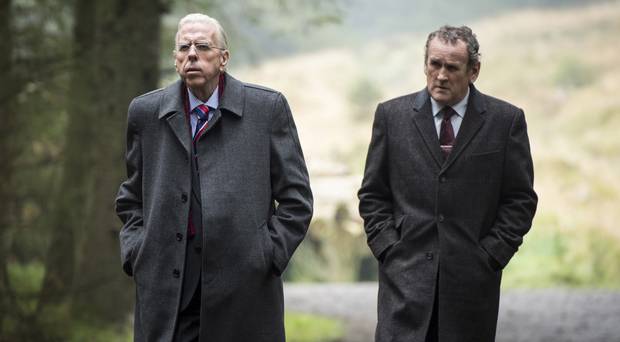

It’s hard to say if the much-impersonated, caricature compatible Ian Paisley would be better inhabited in the movie version of his life by Jack Lemmon or Walter Matthau. It’s harder to imagine either one playing Martin McGuinness. All four are now dead, but the celluloid Grumpy Old Men/Odd Couple double-act appear to be what The Journey filmmakers pinned on the pre-production mood board.
The fate of the Northern Ireland peace process at the negotiating tail end of the decade's earlier Good Friday Agreement, which Paisley was so averse to, depended on the unified power sharing of Sinn Féin and the Democratic Unionist Party. The Journey imagines the course to conciliation between these lifelong enemies, former IRA second-in-command and Sinn Féin chief negotiator McGuinness (Colm Meaney) and the grumpy, older No Nay Never DUP leader Paisley (Timothy Spall) - as a road trip buddy flick. The film's premise is this: amid the 2006 peace negotiations in St. Andrews, Scotland, Paisley insists upon flying home for his golden wedding anniversary. In keeping with security protocol, McGuinness offers to accompany him on the same flight. En route to the airport, their chauffeur Jack (Freddie Highmore), in fact a secret agent under orders from MI5 boss Harry Patterson (John Hurt), makes a bumbling effort to engineer a back seat rapport, as a group of history maneuverers including Tony Blair (Toby Stephens) and Gerry Adams (Ian Beatty) secretly monitor the proceedings through car bugging surveillance.
The Journey’s release is timely. McGuinness’ death this year came not long after stepping down as Northern Ireland's Deputy First Minister in reaction to the Cash for Ash scandal and now the DUP are propping up the diminishing Conservative Party post-UK General Election. In the film, Rev. Paisley’s fire and brimstone tirades put McGuinness’ voice of reason into fair context, but the problem with Colin Bateman’s script is that the St. Andrews Agreement isn’t a comfortable fit for this far-fetched sketch. There are differing accounts of the historic meeting of minds in the run-up to the power sharing relationship that earned McGuinness and Paisley the “Chuckle Brothers” moniker. Why did Paisley have a change of heart? In real life, Tony Blair speculated that it was Paisley’s actual heart trouble and subsequent sense of his own mortality that put peace on his mind. But The Journey's delay device of breaking down after swerving to avoid a deer while powerful observers await a history book handshake, comes off as labored artifice. Director Nick Hamm, former resident director for the Royal Shakespeare Company, paces this back seat drama at a speed too small and cramped for cinema. It would sit better on the stage.
Aside from the components that don’t work, the best of the entertainment comes from the expert performances of Meaney and Spall. Spall has the meat of Paisley, and Meaney, the essence of McGuinness. “We were fighting a civil war, just like you,” McGuinness tells Paisley. “You are nothing like me,” is Paisley's comeback. When McGuinness predicts the consequences of peace, it is with prudence. “We are on the verge of something the wider world will applaud, but our own people will hate.”